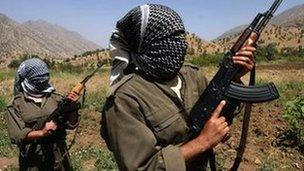PKK releases eight Turkish hostages
- Published

The Kurdish militant group, the PKK, has released eight Turkish soldiers and officials it has held captive in northern Iraq for up to two years.
"We have safely received the prisoners," Husamettin Zemberlioglu, a Kurdish politician said.
The move is being seen as part of efforts to end the three-decade conflict between Turkey and the PKK.
Last month the jailed PKK leader Abdullah Ocalan called for prisoners to be released by both sides.
Turkey's Deputy Prime Minister, Besir Atalay, welcomed their release as "a gesture of goodwill".
"The [peace] process is going just fine. There is big public support, expectation and hope," Mr Atalay was quoted as saying by the state-run Anatolia news agency, before the handover was completed.
On news of the release President Abdullah Gul said: "We are happy that our citizens who had been away from their country for so long, and from whom we had not received any news, are returning."
The freed eight are expected to be escorted across the border into Turkey, where they will be reunited with their families and flown home.
The Kurdistan Workers' Party, or PKK, launched its armed campaign for an ethnic Kurdish homeland in south-east Turkey in 1984.
It is regarded by Turkey, the US and EU as a terrorist organisation. More than 40,000 people have been killed on both sides, since the conflict began.
Last year saw some of the heaviest fighting in decades.
But, after several false starts in recent years, observers say peace efforts now appear to have greater momentum.
Members of the Kurdish Peace and Democracy Party (BDP) helped mediate the release and were in northern Iraq to receive them.
"We hope that the release will open the way for the peaceful solution to the Kurdish issue," said a member of the delegation, Adil Kurt.
"It is important that [they] are returned to their families safely."
- Published4 November 2016
- Published4 February 2013
- Published15 January 2013